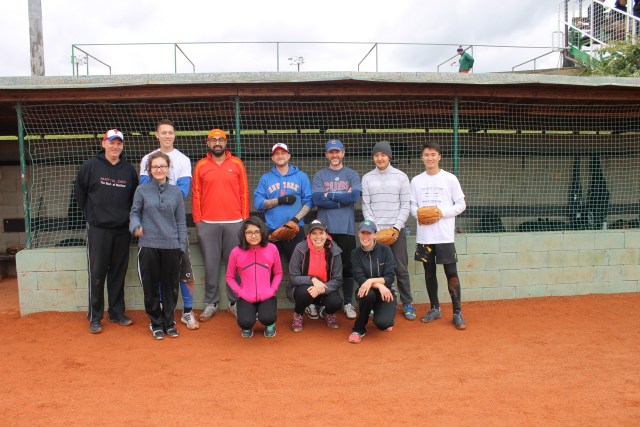“By the way, do you know who won Spirit Week?”
“Anyone found the Medallion yet?”
“Wait, Spirit Week was last week?”
If students care enough to ask about Spirit Week, these are the questions they come up with. Held from Oct. 3 – 9, Spirit Week was Anglo-American University’s first attempt to generate school spirit through a friendly competition among schools. But the “spirit championship” failed to live up to expectations.
Supposedly, students from different schools, like Business Administration, Journalism/Humanities, International Relations, and Law, would take part in a series of events. These included the Treasure Hunt, Colors War, Quiz Night and Bowling Night, to name a few. Students would unite, show their passion through activities, and earn some points for their school. The school with the most points would win a trophy for its remarkable spirit.
The organization of the Spirit Week was a decision of AAU administration within the strategic plan for this year.The concept was initiated by Faculty Senate Secretary Dan Padolsky, who was inspired by a tradition in American high schools to connect students together and celebrate a common spirit.
All the events, with the exception of Club Fair and International Day (which were managed by Student Council) were organized by AAU staff, specifically Iveta Morávková, the Student Life Specialist, and Roman Shbat, the University Advancement Manager (alumni side). Padolsky later added a Treasure Hunt before the week began.
Despite their good intentions, Spirit Week unfortunately lacked the most important element.
“I thought the events were all right,” said Anna Kindyakova, a student journalist at AAU. “But the university spirit was missing, which I thought was essential for all these activities.”
“To be honest, I felt nothing special about the week,” said Chiagoziem Obiakor, a student of Politics and Society.

Lacking enthusiasm, participants didn’t appear in large numbers.
Not all the reactions and comments were negative. Darkhan Majanov described his first time playing softball as “really amazing.” Hira Hamed Inam, First Prize Winner on International Day, said, “I felt so good and happy. I’m really grateful to my university for providing me the chance to prove myself in front of the world.”

But for most students, the spirit was disappointingly weak. They shrugged their shoulders, bit their lips, slightly raised their eyebrows and said, “I guess it was okay.”
How could such an exciting idea be reduced to just “who cares?” Why did students express such apathy toward one of the biggest activities of the year?
Frankly, the first reason was obvious: Students didn’t know what was going on.
“We started promoting it fairly late [only 3 weeks before the first event took place],” Adi Hadzic, the president of Student Council, admitted. “And that was reflected in the overall attendance at the events.”
“Next year I think that Spirit Week should probably be moved to a little bit later in the semester, possibly after the midterm break,” Hadzic added. “And the promotion of the event has to be done starting from the first day of Orientation Week.”
Furthermore, AAU’s marketing department was going through some changes, so the Student Life Specialist didn’t receive any support from it.
“I’m not a marketing person,” Iveta Morávková admitted. “And I didn’t have anyone to help me with the promotion.”
With the lack of promotion, students felt puzzled about the concept of Spirit Week, and thus weren’t hooked enough to get involved. As Spirit Week approached, there were more posters around the university, calling for participation and comments on the program, but students still didn’t show much enthusiasm.
“There was definitely a lack of communication,” Morávková said. “We need better channels to reach all the students.” She also felt the event could benefit from more student involvement and contributions. “For the next Spirit Week, I will do a survey and have meetings with active students who would like to contribute ideas.”
Most students commented that despite the fact that the idea and the activities were amazing, Spirit Week needs to address the above problems and come up with improvement.
“There just wasn’t that much cohesiveness amongst the students, or at least the students in their respective programs, to get together as a team and try to win,” said Melisa Permansu, a student of Humanities.
“There should be a Spirit Week. It’s a nice opportunity to go to events, reach out and meet new people in your program. I think next time it will work much better, once the promotion gets going and students are familiarized with what goes on.”
“This was the first time Spirit Week was ever run, so it was a learning experience,” commented Padolsky. “Seeing how strong the spirit was among some of the students really inspired me with ideas to help make next year’s Spirit Week even better.”

For Spirit Week to succeed, the organizers definitely need to do some fine-tuning, but it’s also clear that students need to take more initiative. They are, in the end, the ones generating the spirit.
“The more people get acquainted with the idea, the more willing they’ll be to participate next time,” said Permansu.“How about karaoke?” she suggested, laughing out loud.
Photo courtesy of AAU Career Center








